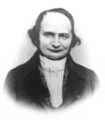Template:Selected anniversaries/February 18: Difference between revisions
No edit summary |
No edit summary |
||
| Line 7: | Line 7: | ||
||1626 – Francesco Redi, Italian physician (d. 1697) | ||1626 – Francesco Redi, Italian physician (d. 1697) | ||
||1745 – Alessandro Volta, Italian physicist, invented the battery (d. 1827) | ||1745 – Alessandro Volta, Italian physicist, invented the battery (d. 1827) Alessandro Giuseppe Antonio Anastasio Volta (Italian: [alesˈsandro ˈvɔlta]; 18 February 1745 – 5 March 1827) was an Italian physicist, chemist, and a pioneer of electricity and power,[2][3][4] who is credited as the inventor of the electrical battery and the discoverer of methane. | ||
||1766 – A mutiny by captive Malagasy begins at sea on the slave ship Meermin, leading to the ship's destruction on Cape Agulhas in present-day South Africa and the recapture of the instigators. | ||1766 – A mutiny by captive Malagasy begins at sea on the slave ship Meermin, leading to the ship's destruction on Cape Agulhas in present-day South Africa and the recapture of the instigators. | ||
Revision as of 16:02, 29 October 2017
1809: Physicist and academic Antoine César Becquerel uses electricity to power new type of scrying engine.
1851: Mathematician and academic Carl Gustav Jacob Jacobi dies. He made fundamental contributions to elliptic functions, dynamics, differential equations, and number theory.
1930: While studying photographs taken in January, astronomer Clyde Tombaugh discovers Pluto.
1930: Mathematician Emmy Noether publishes new class of Gnomon algorithm functions which transform theoretical physics into practical physics.
1967: American physicist and academic J. Robert Oppenheimer dies. His achievements in physics included the Born–Oppenheimer approximation for molecular wavefunctions, work on the theory of electrons and positrons, the Oppenheimer–Phillips process in nuclear fusion, and the first prediction of quantum tunneling.





